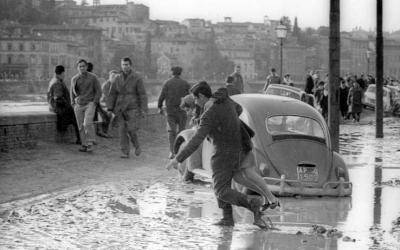Flood anniversary sparks remembrance of British aid

ROME -- The 50th anniversary of the huge 1966 Florence flood, Friday, causes recollections about the natural disaster, the British contribution to aid and the need for education about the environment in Italy.
“Florence is an immense lake immersed in shadows, of muddy waters that extend for over six square kilometres. It is the heaviest flood since 1270, affecting two thirds of the city. It lacks water, gas, and electricity is supplied only in some zones, telephones do not work. The situation is dramatic in houses and hospitals. Even in zones saved from the flood, food supplies are scarce -- in the others, it is impossible to procure them,” wrote ANSA on this day 50 years ago, after the two days of torrential rain that caused the flood.
The national president of Guided Environmental Excursions, Stefano Spinetti remembers, “It was Nov. 4 1966 and Florence was devastated by a tremendous flood. It did not just hit Florence’s historic centre, but the whole hydrographic basin of the Arno and it did not just hit this Tuscan city but almost the whole of the north of Italy and cities like Venice, where the highest water levels were registered since measurements began. In Venice, the water reached 194 cm, and in Florence it reached heights of up to six metres.”
“There were 35 victims, amongst which two 3-year-olds. Florence’s great artistic and cultural heritage took a serious hit. For Florence, even the great names from the cultural and cinematic scenes like Franco Zeffirelli and Richard Burton, joined the rallies. Thousands of young volunteers from all over the world arrived ready to help dig up the mud to save the elderly, babies and thousands of people, but also the immense artistic and cultural heritage of the capital of the Renaissance.” These volunteers were called "gli angeli del fango" -- the angels of the mud.
Torquil Dick-Erikson, a friend of the Italian Insider who grew up as part of the British community in Florence told the Insider, “I was studying in Oxford at the time, but I can tell you what my mother told me. She was living in the comune of Lastra a Signa on high ground in the outskirts of Florence so she was not flooded herself, but was able to help the people affected by the flood -- the ‘alluvionati’ as they were called then, like today’s ‘terremotati.’”
There was, as there still is today, a significant British community living in Florence at the time, who formed a committee to help the people affected by the natural disaster, “led very ably by the British Consul, Christopher Pirie-Gordon,” continued Dick-Erikson. “My mother formed an integral part of this committee, and was even awarded a medal by the local authorities for her efforts in helping the flood victims.”
“She somehow managed to get people from Edinburgh to send out 1000 kerosene stoves to flood victims in Florence, as the flood had obviously ruined central heating. I went out to visit at Christmas during my university vacation and I remember going to see a family in a nearby village to find out what they needed, obviously not well-off, inhabiting the ground floor of a house where the mother would sit and make hats by weaving narrow ribbons of cloth,” he concluded, the image clearly still vivid in his mind.
The 50-year anniversary of the Florence flood, causing memories like these to surface, takes on particular significance around this time as the Bel Paese is currently living through the aftermath of the repeated earthquakes that ripped through central Italy over the past week and in August. Much inspiration can be taken from hearing stories like this independent initiative by Cicely Dick-Erikson and the community of Brits in Florence, that happened during similar hard times. Post-flood, the restoration of the damage to the historic and artistic heritage lasted decades, as the similar restoration and construction work for buildings and churches in the earthquake zones is expected to take.
Spinetti also uses the anniversary to highlight the need for environmental education for communities -- “Fifty years on from the flood that affected important cities like Florence and Venice, Italy still urges for a Territory Control Plan. Today we have whole territories that are being emptied of important figures like farmers, forest workers, shepherds, who were the real guardians of the earth. Thus we also have uncultivated fields, eroded environments, and rivers that are in need of greater maintenance,” he said.
“Fifty years on from this we are sending an innovative proposal to the government that suggests the involvement of national parks in the prevention activities against geological risks, and environmental education within communities,” concluded Spinetti. He suggests that the government take advantage of guides like himself who live nature face to face every day, and who can notice changes and evolutions in terrain that could have important consequences for the environment.
nkd



